
Politics
20:40, 11-Dec-2017
PESCO: How does the EU pave the way for a defense union?
By Le Tian
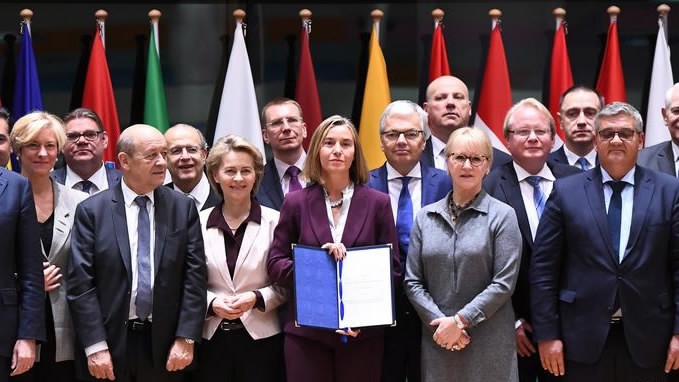
The EU Foreign Affairs Council adopted a decision on Monday establishing Permanent Structured Cooperation (PESCO) with the participation of 25 out of 28 EU member states.
Participating member states also adopted a declaration welcoming a political agreement identifying an initial list of 17 projects to be run under PESCO.
The projects include submarine drones and cyber attack rapid response teams and are expected to be formally adopted by the council early next year.
On November 13, Defense and Foreign Affairs ministers from 23 member states signed a joint notification on the PESCO with EU Foreign Affairs and Security Policy Chief Federica Mogherini said it is a "historic" moment for the continent.
On December 7, Ireland and Portugal also notified of their decision to join.
What is PESCO and who is involved?
Mogherini said PESCO would bring a "new era" of European security describing PESCO as an "inclusive framework to facilitate the joint investments and projects that we so much need to strengthen the ability of the European Union to be a credible security provider for its citizens and globally."
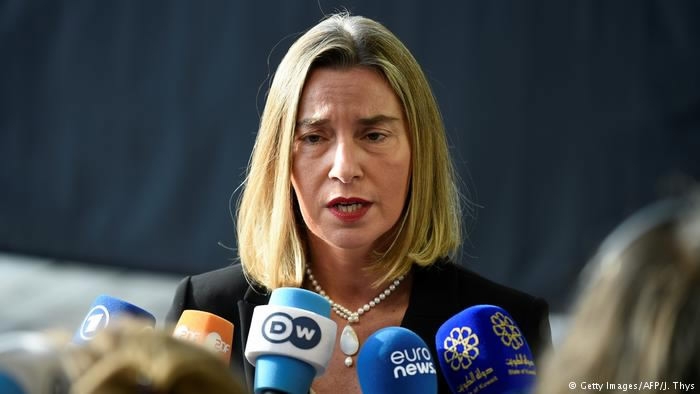
EU foreign affairs and security policy chief Federica Mogherini. /AFP Photo
EU foreign affairs and security policy chief Federica Mogherini. /AFP Photo
PESCO is designed for a two-layer structure including both council and mechanism to decide if member states are fulfilling their commitments. Meanwhile, PESCO's effectiveness would be measured by the projects.
It is voluntary for all EU's 28 member states to join PESCO. Malta are still hesitating whether or not to join the Denmark's side due to its defense opt-out status as it cannot participate in PESCO.
Those countries who didn't sign initially can still participate in later, but the countries that are not fulfilling commitments would be kicked out of the group.
The UK did not sign since it is scheduled to leave the EU in 2019.
Why it's happening now?
With the Brexit coming to the date and US President Trump's criticism over NATO, European leaders used this joint defense pact in show of post-Brexit unity and willingness to defend the EU with own capacities.
The idea of establishing the defense cooperation framework among the EU member states is not new. Lisbon Treaty which entered into force in 2009 has introduced the concept already.
In the past, the UK was always the one who blocked the EU to realize their dream of creating a more unified military unit. Now, UK's silence makes things become easier.
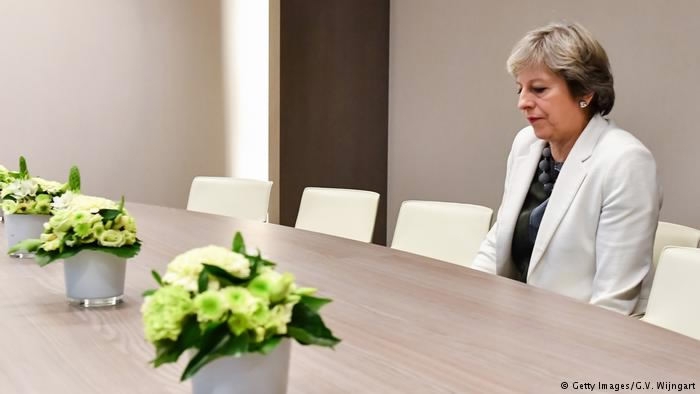
The British Prime Minister Theresa. /AFP Photo
The British Prime Minister Theresa. /AFP Photo
Susi Dennison from the European Council on Foreign Relations said people at the heart of the EU want to see a real drive to prove the EU would work well even if the British leaves.
"It’s a project (PESCO) which delivers on the issues that are important to European voters,” Dennison added.
Meanwhile, Judy Dempsey of Carnegie Europe think-tank pointed out Trump's position on NATO made the EU realizes that "there’s a sense among European capitals… that Europe can’t take the American security umbrella for granted." Hence, to launch PESCO indicates EU would not rely solely on NATO in the future.
Beyond Brexit and Trump, experts noticed there are also some other factors pushing the EU to integrate on defense. The recent repeated terrorist attacks on the continent, the refugee crisis over the borders in 2015 and 2016 and the Russia's proxy war with Ukraine in the east side of the continent all shook up the EU.
PESCO vs. NATO? What are the geopolitical effects?
Although NATO said it welcomed the launch of PESCO, some still dubbed PESCO would create fissures between the EU and NATO.
For EU's side, it emphasized that PESCO is complementary to NATO, in which 22 of the EU's 28 countries are members.
NATO Secretary General Jens Stoltenberg said he welcomed the launch of PESCO describing it as an opportunity to reinforce the EU pillar within NATO.
"I'm a firm believer of stronger European defense, so I welcome PESCO because I believe that it can strengthen European defense, which is good for Europe but also good for NATO," Stoltenberg said.
Washington is happy to hear that showing the EU listened to the Trump's proposal and finally take security responsibility itself, said Dennison.
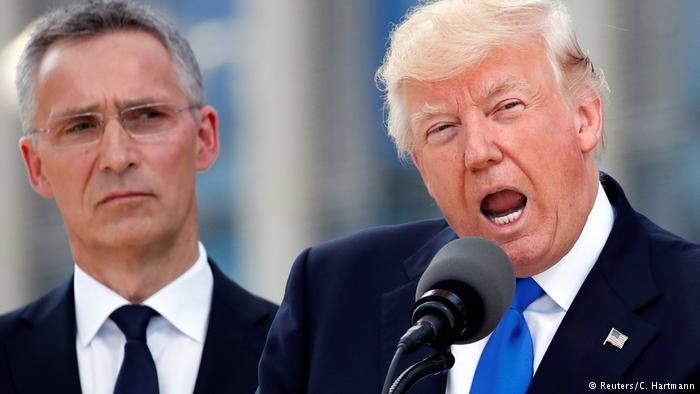
NATO secretary general Jens Stoltenberg stands with US president Donald Trump. /Reuters Photo
NATO secretary general Jens Stoltenberg stands with US president Donald Trump. /Reuters Photo
Dempsey worried about the future relationship between PESCO and NATO saying PESCO may put needless pressure on the trans-Atlantic alliance. "The Europeans will have to be very very clear on what they have to use it for; if it’s to be a competitor to NATO forget it—that would be highly dangerous," he said.
Russia loves PESCO's creation, said Mark Galeotti. The Russian security expert explaining that "Russian defense types are all in favor of a European army because they reckon, not without reason, that it would undermine NATO; PESCO doesn’t create a European army—it’s a long way from that, but actually from the Russian point of view it would actually create fissures between Europe and NATO."
The future: A path beset with difficulties
Expert believed it’s a long way to go for the EU to find their defensive union. “It’s really a framework to try and make cooperation easier, but it doesn’t actually create any cooperation in itself,” said Galeotti.
Gelotti noted the EU said to use PESCO to avoid the current wasteful situation where 28 members states often buy equipment from 29 different suppliers. However, he did not believe expect things would change dramatically by PESCO since arms manufactures is a crucial force in each member state's economy.
Dalibor Rohac, a research fellow at the American Enterprise Institute, believed the PESCO framework is insufficient to turn Europe into a coherent strategic actor.
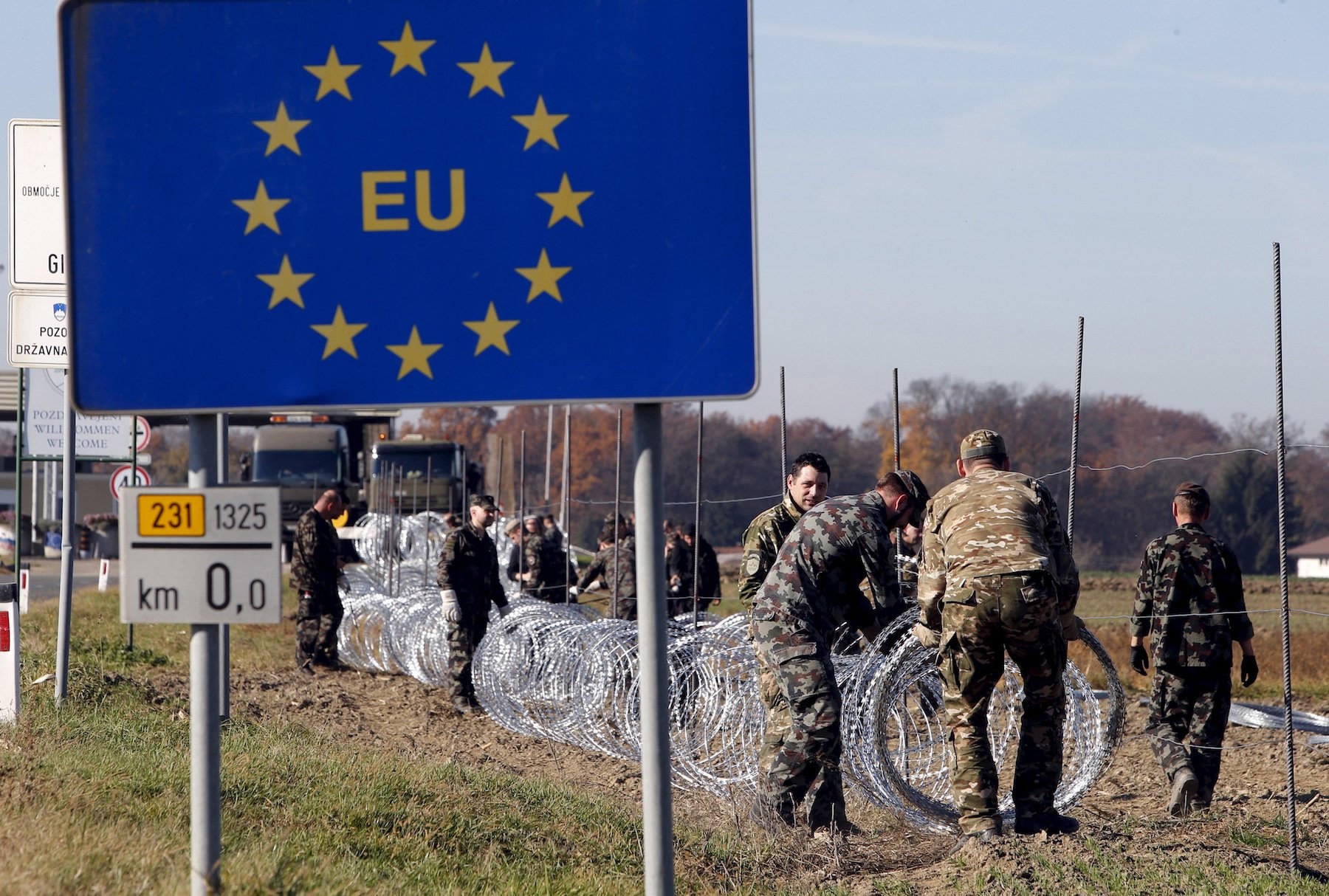
Slovenian soldiers set up a barbed wire perimeter near an EU sign in 2015, part of its efforts to manage the migrant crisis. /Reuters Photo
Slovenian soldiers set up a barbed wire perimeter near an EU sign in 2015, part of its efforts to manage the migrant crisis. /Reuters Photo
"Although duplication and fragmented procurement processes are a real problem, the main issue is the reluctance of generations of European leaders to spend real resources on their countries’ militaries," he said.
Dempsy is also not positive about PESCO'S future. She analyzed although some small scale forces' integration existing in some EU member's ground force, doing more of this only sounds great in principle.
"But you’re going to need much more than PESCO to make this work. The EU needs a proper command structure and a military headquarters,” Dempsy said. “The leaders of institutions and member states have to explain to their publics why we need proper European security and defense otherwise PESCO won’t get off the ground.”
Rohac also worried about issues from the political side, especially between Berlin and Paris.
Paris hopes that the participating EU countries will be as ambitious as possible in the development of an independent defense policy. Berlin's side, however, wanted to keep the number of participating countries as large as possible.
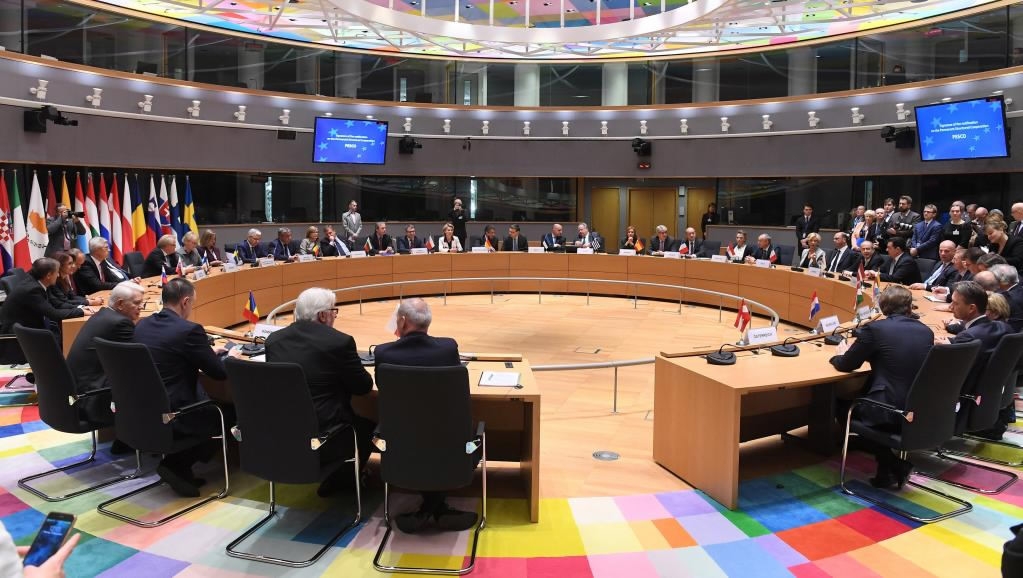
Defense and Foreign Affairs ministers of 23 EU countries sign PESCO agreement in Brussels, Belgium, November 13, 2017. /Reuters Photo
Defense and Foreign Affairs ministers of 23 EU countries sign PESCO agreement in Brussels, Belgium, November 13, 2017. /Reuters Photo
"The potential is big, but now they have to deliver something. They’ve skirted around this issue; they don’t like bringing it up. But if we want military cooperation, we have to face very hard issues," Dempsy concluded.
7971km

SITEMAP
Copyright © 2018 CGTN. Beijing ICP prepared NO.16065310-3
Copyright © 2018 CGTN. Beijing ICP prepared NO.16065310-3